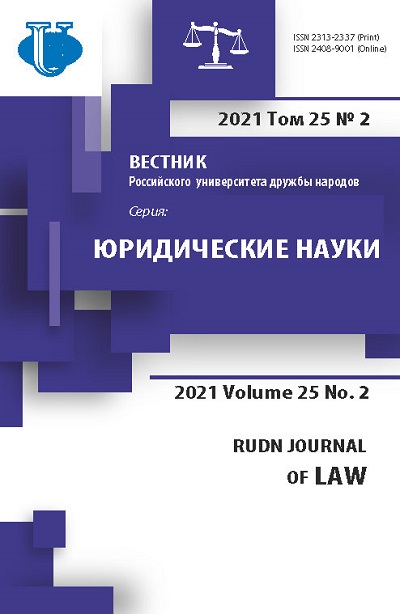Digitalization of state environmental management: Legal aspects
- Authors: Vlasenko V.N.1, Shirobokov A.S.1
-
Affiliations:
- Russian State University of Justice
- Issue: Vol 25, No 2 (2021)
- Pages: 601-619
- Section: LAW AND DIGITAL TECHNOLOGIES
- URL: https://journals.rudn.ru/law/article/view/26716
- DOI: https://doi.org/10.22363/2313-2337-2021-25-2-601-619
- ID: 26716
Cite item
Abstract
This article discusses the features of the digital transformation of the following state functions: information support in the field of environmental protection, state accounting in the field of environmental protection, regulation in the field of environmental protection (in terms of the use of the best available technologies), state environmental supervision, and administration of fees for negative environmental impact (NVOS). It is proved that the data of the state register of objects of negative impact, formed as a result of the state accounting of objects that have a negative impact on the environment, the implementation of state environmental supervision, and the administration of fees for NWOS should become the basis for making environmentally significant decisions. To expand the scope of use of this information, it is proposed to ensure the interoperability of the state register data. In addition, the authors come to the conclusion that digitalization of technological rationing based on the best available technologies (hereinafter also BAT) is associated with the use of such technologies as data turnover regulation, experimental legal regimes (regulatory sandboxes) and assessment of the compliance of the applied technology with the best available technology. Moreover, when implementing state environmental supervision, inspections should be planned based on the hazard category of objects of negative impact and when conducting inspections, remote control methods should be used. It is also essential to introduce electronic test sheets for self-checking enterprises. Finally, the digitalization of calculating and collecting fees for NVOS should ensure the smooth functioning of calculating fees by the payer in digital format and control over the correctness of calculation and collection by the supervisory authority.
About the authors
Valery N. Vlasenko
Russian State University of Justice
Author for correspondence.
Email: kafzem@rsuj.ru
ORCID iD: 0000-0001-7479-2774
Candidate of Legal Sciences, Deputy Head of the Department of Land and Environmental Law
69 Novocheremushkinskaya str., Moscow, 117418, Russian FederationAlexey S. Shirobokov
Russian State University of Justice
Email: kafzem@rsuj.ru
ORCID iD: 0000-0001-5905-8301
Candidate of Legal Sciences, Associate Professor of the Department of Land and Environmental Law
69 Novocheremushkinskaya str., Moscow, 117418, Russian FederationReferences
- Alimova, D.F. (2020) On the use of digital technologies in the activities of public authorities. In: Pashentseva D.A. (ed.) Legal values in the light of new paradigms of the development of modern civilization: collection of scientific papers. Moscow, IZiSP: INFRA-M, 2020. 250-255. (in Russian).
- Belikova, K.M. (2018) Features of the legal regulation of the digital intellectual economy. Zakon i pravo. (8), 26-30. (in Russian).
- Khalin, V.G. & Chernova, G.V. (2018) Digitalization and its impact on the Russian economy and society: advantages, challenges, threats and risks. Administrative Consulting. (10). 46-63. (in Russian).
- Kichigin, N.V. (2018) Minimization and prevention of environmental and legal risks. Journal of Russian Law. (8), 144-154. (in Russian).
- Kudinova, G.E., Zibarev, S.S. & Rozenberg A.G. (2011) Development and application of an automated system for administration of payments for negative environmental impact. Izvestija Samarskogo nauchnogo centra Rossijskoj akademii nauk. (5), 282-286. (in Russian).
- Plotnikov, A.V. (2019) Problems of legal regulation of the digital economy. Moscow journal. (7), 217-224. (in Russian).
- Popova, N.F. (2020) The need for digitalisation of public administration in the Russian Federation. Administrative Law and Procedure. (2), 48-53. (in Russian).
- Sukhova, E.A. & Abanina, E.N. (2020) Legal problems of the digital transformation of the environmental management system as a mechanism to ensure environmental safety. Russian Judge. (8), 17-20. (in Russian).
- Shatkovskaya, T.V. (2019) Goals and interests in digital law. In: Pashentsev D.A., Zaloilo, M.V. Transformation of Legal Reality in the Digital Age: Collection of Scientific Papers. Moscow, IZiSP: INFRA-M Publ. (in Russian).
- Tikhomirov, Yu. A. & Nanba, S.B. (eds.). (2019) Legal concept of robotization: monograph. Moscow, Prospekt Publ. (in Russian).
- Vaipan, V.A. (2018) Legal regulation of the digital economy. Entrepreneurial Law - Application. (1), 12-17. (in Russian).
- Zaloilo, M.V. (ed). (2021) Artificial Intelligence in Law: Scientific and Practical Guide]. Moscow, Infotropik Media Publ. (in Russian).
- Zhukov, V. (2019) Implementation of the best available technologies: problems and solutions. Environmental parliamentary bulletin. Available at: http://ecoparlament.ru/aktsenty-nedeli/article_post/vnedreniye-nailuchshikh-dostupnykh-tekhnologiy-problemy-i-resheniya [Accessed 02 February 2021]. (in Russian).
- Zubarev, S.M. (2020) Legal risks of digitalization of public administration. Actual Problems of the Russian Law. (6), 23-32. (in Russian).
Supplementary files















